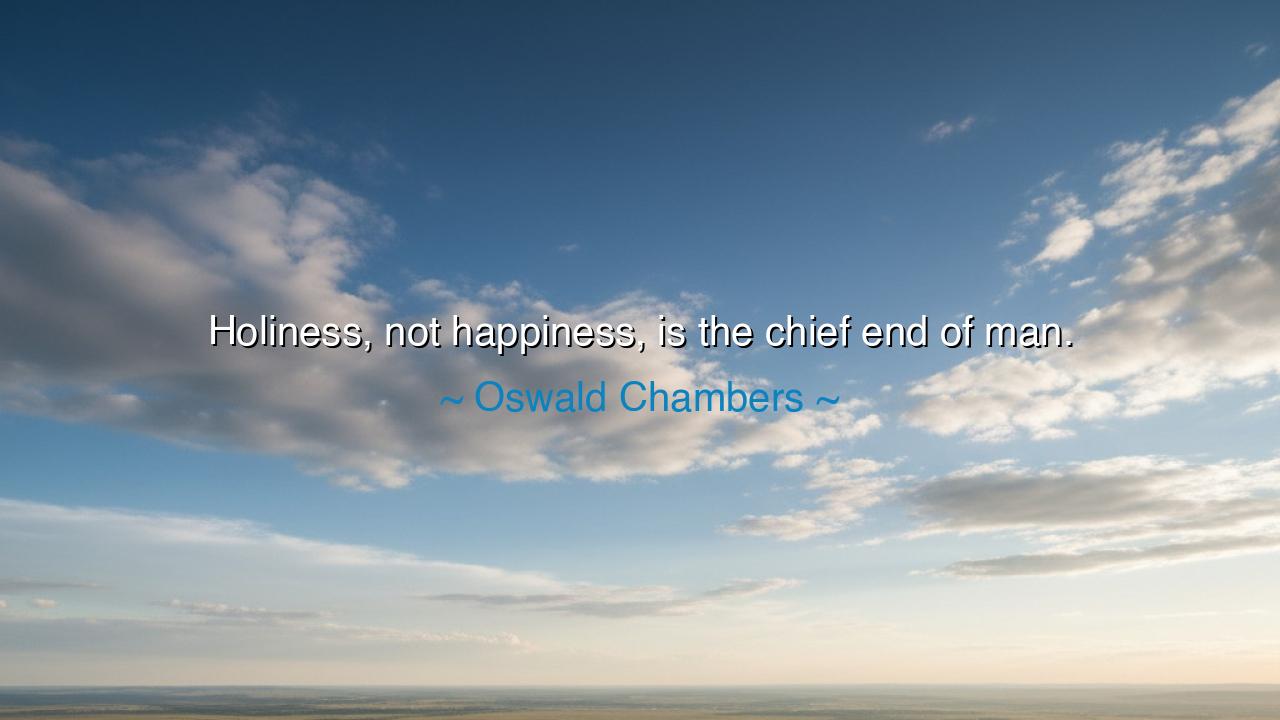
Holiness, not happiness, is the chief end of man.






When Oswald Chambers, the devout Scottish preacher and author of My Utmost for His Highest, wrote, “Holiness, not happiness, is the chief end of man,” he struck at the very heart of a truth that has been forgotten in many ages — that the purpose of life is not to be pleased, but to be pure. His words are not a denial of joy, but a redirection of it. For happiness is a fleeting emotion, dependent upon circumstances and seasons; but holiness — the inner likeness to the divine — is eternal, rooted in the soul’s relationship with God. Chambers, a man who devoted his life to spiritual discipline and the pursuit of truth, saw that modern man’s obsession with comfort and self-satisfaction had dulled his higher purpose. He calls us back to the eternal path — the one walked by saints, prophets, and martyrs — the path where suffering refines and virtue becomes joy.
The origin of Chambers’ wisdom lies deep within the Christian tradition. His thought echoes the Westminster Catechism’s teaching that “the chief end of man is to glorify God and enjoy Him forever.” But Chambers, seeing the modern heart’s tendency to confuse pleasure with divine joy, sharpened this truth into a warning. To him, holiness was not an ornament of faith, but its very essence — the alignment of the human will with the will of God. Happiness may arise as a fruit of such alignment, but it must never be the root. He reminds us that the soul is not made for indulgence, but for transformation. To live for happiness alone is to live as a shadow of one’s true self; to live for holiness is to live in the full light of eternity.
Consider the great souls of history — those who walked the narrow road of sacrifice. Mother Teresa, who labored among the dying in Calcutta, often confessed that she did not feel happiness; she felt emptiness, even spiritual darkness. Yet she continued her work, her heart steadfast in obedience. The world saw her radiance and called it joy, but she knew it as holiness — the burning away of self for the sake of divine love. This is the paradox of Chambers’ teaching: that when we cease to chase happiness and instead seek holiness, we receive a joy far deeper — a joy not of laughter alone, but of peace, endurance, and meaning. For happiness without holiness is the wine that quickly turns sour; holiness without happiness is the flame that purifies and never dies.
Chambers’ words also stand as a challenge to the modern age, which glorifies pleasure and comfort above all else. We are taught that the measure of success is the abundance of happiness — health, wealth, leisure, and freedom from pain. Yet, history has shown that when humanity seeks only to be comfortable, it loses its greatness. The civilizations that have endured were those founded not on indulgence, but on discipline, on reverence, on the pursuit of what is right, even when it costs much. The ancients understood that the soul, like iron, must be forged in fire. To choose holiness is to accept that suffering has purpose — that through it, the soul becomes strong, luminous, and free.
One might recall the story of Job, the righteous man tested beyond measure. His happiness was stripped away — his wealth, his children, his health — yet in the ashes he found a truth greater than comfort. When he beheld God’s majesty, he said, “I had heard of You by the hearing of the ear, but now my eyes see You.” That moment was not happiness — it was holiness. Job’s reward was not the restoration of worldly things, but the awakening of his soul to the eternal presence of God. Chambers teaches this same truth: that life’s trials are not obstacles to happiness, but instruments of sanctification. We are not here to gather pleasures, but to be purified, until the divine image within us shines forth.
To pursue holiness is to seek wholeness — the restoration of the soul to its original harmony with the Creator. It is a lifelong pilgrimage, filled with moments of joy but also of discipline, repentance, and humility. The holy man or woman is not the one who smiles without sorrow, but the one who walks through sorrow without losing faith. In every act of obedience, in every quiet act of love, in every moment of surrender, holiness grows — and with it, a deeper kind of happiness: one not dependent on the world, but born from the union of the soul with God. This, Chambers understood, is the secret of all true fulfillment.
So, my listener, take this truth to heart: Do not seek happiness — seek holiness, and happiness will follow like a shadow that cannot leave the light. Let your days be guided not by what pleases you, but by what purifies you. When hardship comes, do not curse it, for it may be the hand of grace shaping your spirit. When joy comes, receive it with gratitude, not as your goal, but as a gift. For in the end, all happiness fades, but holiness endures beyond the grave. As Oswald Chambers wrote and lived, the purpose of man is not to be comfortable, but to be consecrated — not to rest in fleeting pleasure, but to rise into the eternal likeness of God. And that, my friends, is the highest calling and the deepest joy a soul can ever know.






AAdministratorAdministrator
Welcome, honored guests. Please leave a comment, we will respond soon